Best Supplements to Boost Your Energy in 2023
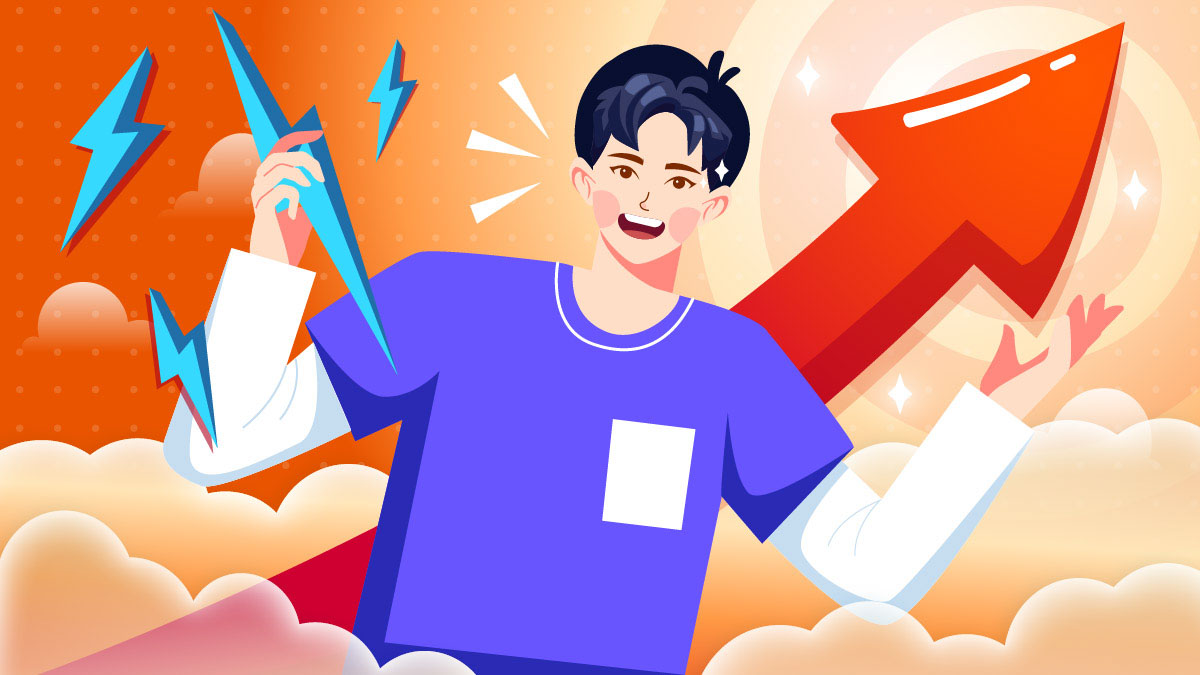
This article provides a list of the 11 best supplements for an energy boost. We highlight natural minerals and vitamins that your body may lack when it’s chronically exposed to stress and deprived of essential nutrients. You’ll learn how to use and combine energy supplements to get the best results and avoid side effects from interactions.
Stop relying on coffee. Try these energy supplements and vitamins for a stable and safer boost.
Did you know that three out of five adults in the US report feeling constant fatigue? Extreme tiredness can result from a number of issues like lack of sleep, not eating nutritious food, experiencing chronic stress, or overworking yourself.
If you’re constantly tired throughout the day or struggle with shortness of breath, brain fog, muscle weakness, or mood swings, you may have nutrient deficiencies.
Imbalances in vitamins and minerals may compromise the communication between neurons and impair mitochondria functioning, which is critical for producing energy.
Here are some of the best supplements for an energy boost, including vitamins, minerals, adaptogens, and nootropic compounds.
Give us 8 minutes, and we’ll show you how to have more energy than 66% of people.
Best Supplements for Energy Boost
In addition to green tea, yerba mate, coffee, and other energy boosters, certain botanicals can help elevate your energy.
If your diet lacks essential vitamins and minerals, we recommend consulting a doctor and selecting the right supplements to level these deficiencies.
A healthcare professional will be able to guide you when it comes to the dosage and types of supplements.
Our list also includes natural products that you can use for a direct, short-term energy boost. However, make sure to use them responsibly because abusing energy boosters can lead to disruptions in the functioning of neurotransmitters and cause behavioral dependence.
Here are our eleven picks for the best energy supplements.
Caffeine with L-Theanine
Caffeine is the main stimulating ingredient in coffee, but you can also find it in tea, cocoa beverages, energy drinks, and sodas.
However, not everybody can tolerate regular doses of caffeine. Sensitive users can experience nervousness, restlessness, irritability, and a crash once the initial energy boost wears off (1).
Blending caffeine with l-theanine as a supplement may be an easy way to prevent caffeine-induced jittery.
L-theanine is an amino acid naturally occurring in tea and some mushrooms. Studies show that it can promote relaxation without sedation. The combination of caffeine and l-theanine has been found to improve cognition and decrease fatigue (2).
Together, these results suggest that adding l-theanine to coffee can help increase energy-boosting benefits without the side effects.
A healthy caffeine intake shouldn’t exceed 400 mg per day; this is equivalent to 3-4 cups of coffee per day.
Ashwagandha

Ashwagandha is one of the most beneficial herbs in Indian medicine – one of the world’s oldest therapeutic systems.
Ashwagandha increases energy levels by enhancing your body’s resistance to physical and mental stress.
In one study, participants who supplemented ashwagandha reported significant improvements in several markers of anxiety and stress compared to the placebo group. Their cortisol levels also dropped by 28%. Cortisol is a hormone that increases when we’re stressed (3).
In addition to easing stress and anxiety, studies also suggest that ashwagandha can decrease post-exercise fatigue.
A study of elite cyclists concluded that those who took ashwagandha were able to drive for 7% longer than controls (4).
Ashwagandha supplements for energy boosts are safe and have a low risk of side effects.
Vitamin B12
Vitamin B12, together with other B vitamins, helps turn the food you consume into energy that your cells can use.
It also promotes healthy nerve functioning and takes part in the formation of new blood cells, helping prevent anemia that can make you feel drained from energy.
Vitamin B12 occurs in a range of animal products, such as meat, fish, and dairy. Many foods are also supplemented with B12, allowing most people to meet their vitamin B12 requirements by consuming a balanced diet.
Still, some populations may be exposed to B12 deficiencies, which occur when you don’t supply your body with enough usable B12 to absorb the necessary amount (5).
If you have a B12 deficiency, taking B12 supplements may significantly boost your energy levels.
Melatonin
Melatonin is a natural sleep hormone produced in the pineal gland and released depending on the time of the day. It increases in the evening and drops in the morning.
Taking melatonin in the form of supplements can be an effective way to treat insomnia, a sleep disorder affecting around 30% of the adult population around the world (6).
Chronic insomnia can be detrimental to your energy levels. Symptoms include difficulty falling asleep, waking up at night several times, and poor sleep quality.
For people with chronic fatigue syndrome, melatonin supplements may not only help improve sleep but also sharpen focus and boost energy.
CoQ10
CoQ10 is short for coenzyme Q10, a molecule produced naturally in the body. CoQ10 has a few different forms, including ubiquinol and ubiquinone. They’re found in all cells in the body.
The heart, kidneys, and liver are home to the largest concentrations of CoQ10. Cells can use them to produce energy and protect themselves from oxidative damage.
The best way to source CoQ10 is from organ meats. Muscle meat also contains CoQ10, but not in large enough amounts to significantly boost its levels in the body.
CoQ10 supplements help reduce deficiencies, which progress with age and may be particularly low in people with certain cancers, type 2 diabetes, heart failure, and those who take statins (7).
However, if you have sufficient levels of CoQ10, supplements probably won’t boost your energy.
Iron
The body produces hemoglobin from iron. Hemoglobin is a protein in red blood cells that distribute oxygen throughout the body from your lungs to the organs and tissues.
Without sufficient levels of iron, your blood cells can’t effectively transport oxygen, resulting in anemia, which may leave you feeling weak and out of energy.
Causes of iron deficiency anemia include a diet that’s poor in iron, sudden blood loss, and pregnancy. Pregnant women need twice as much iron to support the healthy growth of the fetus (8).
However, iron is best taken under the supervision of a doctor because there are health risks associated with excessive iron intake.
Rhodiola Rosea
This herb grows in certain cold, mountainous areas and is widely used as an adaptogen.
As mentioned earlier, adaptogens increase your body’s natural ability to fight off stress.
An analysis of 11 studies that investigated the effects of Rhodiola on physical and mental fatigue in more than 500 people concluded that the herb enhanced physical performance and eased mental fatigue (9).
The research team didn’t notice any side effects associated with Rhodiola supplements.
The plant also has potential antidepressant qualities. A 2-week clinical trial concluded that Rhodiola reduced symptoms of depression almost as effectively as Zoloft, a commonly prescribed antidepressant (10).
Creatine
Creatine is an energy-boosting compound found in red meat, pork, poultry, and fish. It can quickly provide your body with energy by supporting the synthesis of adenosine triphosphate (ATP).
ATP is the energy currency of life. When your body converts ATP to energy, it loses a phosphate group and turns into adenosine diphosphate.
Creatine lends its phosphate to ADP — and it becomes ATP again. That’s how you receive that quick boost of energy
Creatine is especially effective for high-intensity, short-duration workouts, such as:
- Strength training (weightlifting)
- Short, powerful bursts of activity (e.g., jumping, swimming)
- Shorts sprints (e.g., intermittent sprints or 100-meter sprints)
In a review of 53 studies, the authors found that creatine supplements improved energy and helped boost strength on the bench press by 5% (11).
Another review of older adults who supplemented creatine showed that they gained 3.1 pounds of lean muscle mass compared to those who didn’t take it.
Beetroot Powder
Beetroot powder is extracted from the beetroot vegetable and is packed with high levels of nitrate.
Nitrate produces nitric oxide in the body, which increases blood flow and oxygen delivery by relaxing blood vessels.
When this happens, your body can produce energy more efficiently, especially when you’re working out.
Several analyses of studies have found that taking beetroot extract increases the endurance of athletes. In some cases, the athletes could exercise for 25% longer than those who took a placebo (12).
That’s because nitrate reduces the amount of oxygen necessary for high-intensity exercises.
Magnesium
Magnesium is super important for your energy because it controls almost all biological processes in the body, including support for muscle and nerve function and energy production (13).
Chronically low magnesium levels can increase the risk of high blood pressure, heart disease, and type 2 diabetes. They also lead to sleep deprivation, negatively affecting your energy on all possible levels.
Magnesium is involved as a cofactor in over 300 enzyme systems and is required for fundamental functions such as energy production and nucleic acid synthesis. Reviews of the scientific literature have found that taking magnesium can boost energy, improve sleep, increase resilience to stress, and elevate mood.
CBD: A Simple Way to Optimize Your Energy Levels
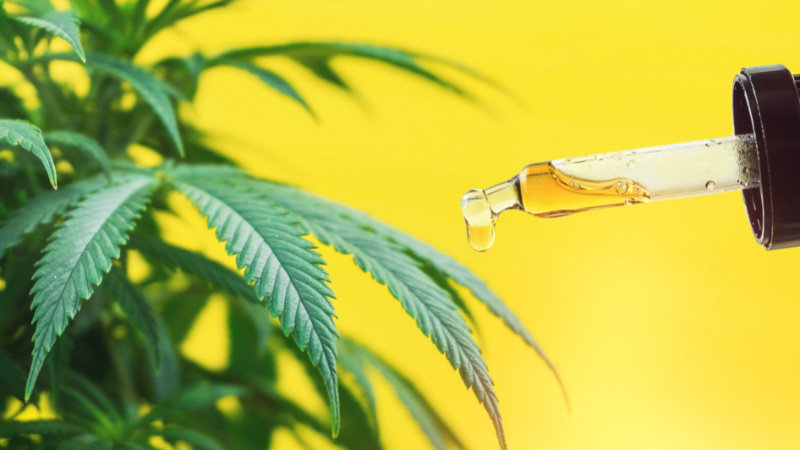
CBD is one of the two major compounds in cannabis plants. Unlike THC, it doesn’t make you feel high because it doesn’t have intoxicating properties.
Instead, you get plenty of benefits from CBD. It modulates the activity of the endocannabinoid system (ECS), the master regulatory network in all mammals. The ECS regulates essential functions like memory, mood, pain perception, immune response, body temperature, reproduction, neurogenesis, appetite, etc.
The ECS produces its own endocannabinoid, whose deficiencies are associated with anxiety, poor sleep, depression, migraines, autoimmune conditions, and chronic fatigue.
CBD signals the ECS to produce more endocannabinoids and inhibits the FAAH enzyme that breaks them down (14).
On top of that, CBD acts on serotonin, dopamine, GABA, and other neurotransmitters engaged in motivation, energy, and emotional processing (15, 16, 17).
Low doses of CBD have been shown to increase alertness and focus (18). CBD also reduces stress and systemic inflammation, the two main causes of low energy.
Larger doses, on the other hand, can make you feel sleepy and fix REM sleep disorders, giving you more energy and a clear head the next day (19, 20).
Best CBD Supplements for Energy Boost
CBD has an excellent safety profile, but since the market is underregulated, nobody controls the production of CBD supplements. This creates room for fly-by-night companies and sheds responsibility for quality control on consumers.
Here are three surefire picks if you’re looking for safe and effective CBD products for energy. All of these companies offer well-thought-out formulas, third-party lab-tested products, and caring customer service that goes above and beyond to help you pick the right supplement for your health needs.
1. Royal CBD
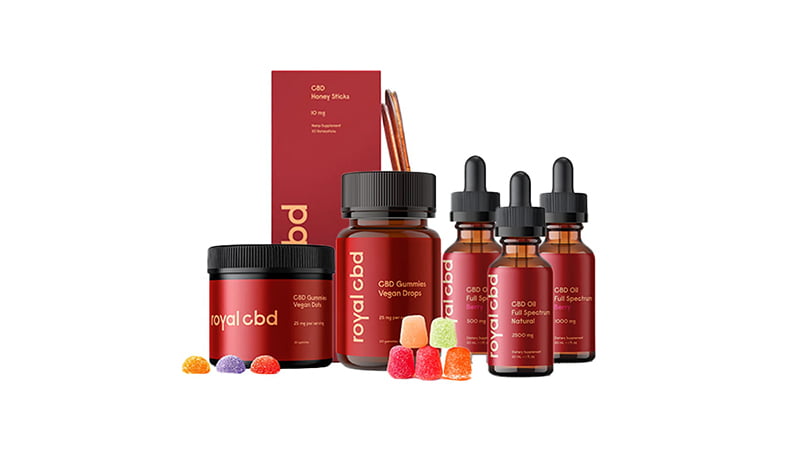
Get 15% off all Area 52 products. Use code “CFAH” at checkout.
Royal CBD is a Nevada-based brand that leaves no room for mediocrity in the CBD industry. The company offers a broad range of full-spectrum products from organic hemp that target different health needs and cater to different lifestyles.
I use three products from Royal CBD to boost energy every now and then:
- Full-spectrum 2500 mg CBD oil: it delivers 83 mg of CBD per serving and an array of minor cannabinoids and terpenes that leverage the whole-plant synergy. It’s a great product for microdosing, making a little go a long way at its price.
- Full-spectrum CBD gummies: a great alternative if you don’t like the texture and flavor of CBD oil. Each low-sugar energy-boosting CBD gummy helps in weight loss and packs a 25 mg of full-spectrum CBD in an assortment of fruity flavors. You can choose between sweet and sour options, and if you don’t want to take any THC in your supplements for energy, Royal CBD offers a broad-spectrum variant.
- CBD energy capsules: this is my favorite energy supplement when I need to get down to deep work and keep distractions away. The formula includes a blend of 25 mg CBD, 10 mg CBC, and 100 mg of each caffeine and L-theanine.
2. Gold Bee
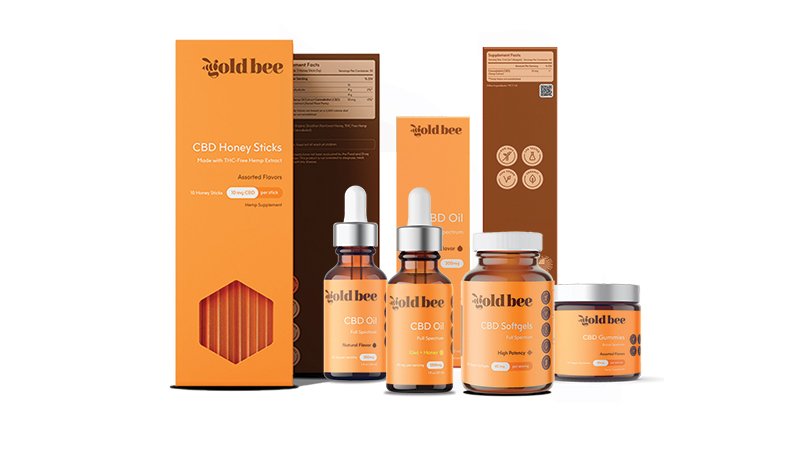
Gold Bee offers a broad selection of CBD supplements from terpene-rich hemp strains infused with superfoods like honey from Brazilian rainforests and coconut oil. All of Gold Bee’s products are third-party tested in an ISO-certified laboratory for potency and purity, including pesticides, heavy metals, solvents, and mold.
Gold Bee has two energy supplements in its lineup:
- Full-spectrum 1200 mg CBD oil: A less potent alternative to Royal CBD oil. While it doesn’t contain as much CBD, it comes in two tantalizing flavors — kiwi and lychee — both of which taste great and finally make supplementation with oil enjoyable.
- Energy Gummies: Gold Bee combines CBD, CBC, caffeine, and B12 in delicious, sweet, strawberry-flavored vegan gummy cubes. Each gummy comes with 25 mg of CBD and 10 mg of CBC. You can use these diabetes-free CBD gummies to complete more workloads in a shorter time span.
3. Area 52
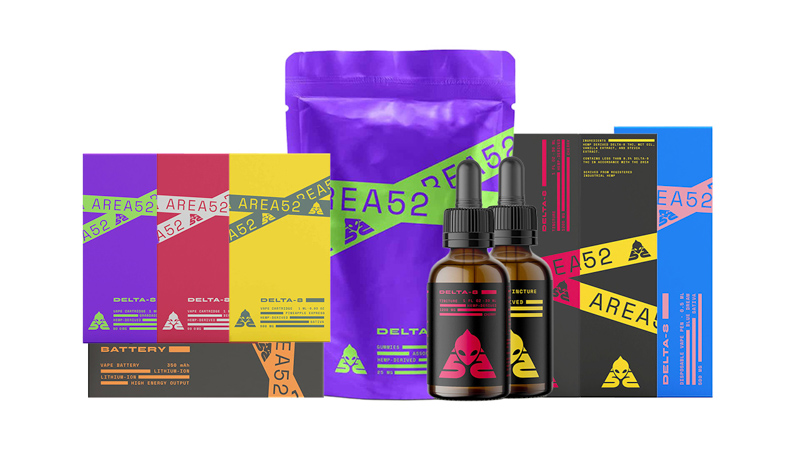
Area 52 specializes in unique cannabinoid extracts from minor cannabinoids, such as delta-8 THC, CBC, CBN, and CBG. The company promises to “alienize your mind” with its products — but does it mean they’re decent energy boosters?
Not all of them. Many products from Area 52 combine cognitive buzz with deep relaxation, but some of these supplements can give you a positive jolt of energy.
I’m a huge fan of the inhalables, such as:
- Delta-8 THC vape carts: vapes kick in within minutes and deliver the highest concentrations of delta-8 THC to your system. Area 52 offers vape carts infused with terpenes from different cannabis strains. I use the sativa and hybrid varieties to boost energy in the morning and maintain it throughout the day.
- Delta-8 THC pre-rolls: sometimes, I fancy a nicely rolled joint, and that’s where delta-8 pre-rolls come in handy. They contain organic CBD flower infused with delta-8 THC distillate and terpenes for more pronounced effects.
Area 52 also has one type of CBD oil in its lineup. It features 40 mg of CBD and 2 mg of delta-9 THC per serving, making for the perfect middle ground between the oils from Royal CBD and Gold Bee.
Other Ways to Boost Energy
Supplements are just that — supplements; an addition to a more complex plant, a bigger picture.
Make sure to include the following modifications in your lifestyle if you want to have more energy daily:
- Control stress: stress consumes huge amounts of energy. Talking with friends, joining a support group, or starting psychotherapy can help diffuse stress. Meditation, mindfulness, and yoga are also effective in reducing stress.
- Exercise: Increasing the amount of exercise will help you achieve healthier sleep and reduce physical tension. Working out is also a great way to clear your head from racing thoughts because it allows you to focus on just one thing. After exercises, your dopamine and serotonin levels increase, elevating your mood and increasing your energy.
- Reduce your workload: One of the main reasons for low energy levels is overwork. Try to organize your work in a neat manner, reduce the number of distractors, and devote 4 hours to deep work instead of just trying to survive in the mud of multitasking.
- Quit smoking: Smoking can siphon your energy by causing sleep deprivation. The nicotine in tobacco has stimulating properties, so it increases heart rate, raises blood pressure, and activates brain waves associated with wakefulness, making it more difficult to fall asleep. And once you succeed, you may be awakened by your cravings.
- Cut down on sugar: food high in the glycemic index will lead to insulin spikes, and once your they begin to plummet, you’ll start to feel tired and unmotivated. Make sure to cut out these foods and switch to a nutrient-dense diet that consists of whole foods, high-quality protein, healthy fats, and complex carbs.
- Limit alcohol: alcohol is an absolute toxin, meaning even the smallest dose is dangerous to your health. The sedative effect of alcohol can make you feel tired, and consuming alcohol before sleep will cause you to spend more time in the non-deep sleep stage, making you feel drained from the energy the next day.
- Hydrate yourself: water can be more effective for almost all types of exercises than pricey sports drinks. If your body is short of fluids, fatigue is one of the first signs. Drinking plenty of water can help reduce the feelings of tiredness and improve your concentration.
How to Choose the Best Supplements for Energy Boost

The best supplements for an energy boost combine natural ingredients that optimize your body’s energy metabolism and help you maintain sharp focus and stable energy levels throughout the day.
However, not all supplements are equally effective. When choosing the best energy supplements for this list, we focused on:
- Scientific evidence: the natural compounds in our ranking have been extensively studied in clinical trials and reviewed by meta-analysis for their ability to boost energy.
- Potency: the dose of the active ingredient in your supplement should be enough to either produce a direct energy boost or effectively level mineral and vitamin deficiencies in your body.
- Formula: the best supplements for energy boost contain more than one ingredient. These ingredients work synergistically to enhance their benefits and mitigate potential side effects.
- Safety: It’s one thing if the ingredients in your energy supplements are safe, but you also need to ensure the safety of the entire product; check for third-party lab reports to learn what’s inside your supplement and whether it’s free from contaminants like pesticides, heavy metals, fungus, or solvents.
When to See a Doctor
It’s okay to feel tired from time to time. We all have good and bad days. Sometimes, you may skip a meal or sleep two hours less than required — but as long as you maintain a healthy lifestyle and take proper care of your energy through a nutritious diet, fatigue shouldn’t become a chronic issue.
However, when you’re feeling constantly tired, and the lack of energy takes a toll on your job, social life, and family, it may be worth seeking professional help.
A consultation with a holistic health professional will help you determine the root cause of your chronic fatigue — such as nutrient deficiencies, work overload, or poor sleep hygiene — and address the problem in the best fashion.
Energy boosters work great as a quick pick-me-up remedy, but they won’t help you in the long run unless you bring your body back to homeostasis.
Energy Supplements FAQs
Which vitamin provides the most energy?
The B complex (biotin, folate, B12, pantothenic acid, thiamin, riboflavin, and niacin) provide the most energy, as they support cell metabolism, help the body transform carbs and fats into energy, and transport energy nutrients throughout the body.
Which mineral is the most important for energy?
Iron and magnesium are the most important minerals for energy.
Iron promotes the production of hemoglobin, allowing the body to effectively transport oxygen throughout the body and ensure more energy.
Magnesium, on the other hand, has the most complex role of all minerals, interacting with 300 enzyme systems, and is required for sustained energy production on top of regulating sleep, stress responses, immune function, communication between neurons, and the synthesis of nucleic acid.
Does B12 give you energy right away?
Unfortunately, not. Taking a B12 supplement or any vitamin B won’t give you an instant kick of energy like a cup of coffee. It may take a few weeks of regular supplementation until it boosts your energy levels.
Why is coffee not good for everyone?
Not everyone tolerates coffee. Some people get anxious right away, while for others, the crash comes shortly after the energy boost wears off. There are also people for whom coffee creates digestive issues and abdominal discomfort.
Besides, coffee doesn’t actually give you energy. It rather fools your brain that it’s not tired by blocking the release of adenosine. Coffee also affects your adrenal glands, causing them to produce more adrenaline and norepinephrine — that’s why you’re alert after drinking espresso.
Do adaptogens boost energy?
Yes, but they do it in a less direct way than coffee. Adaptogens help you reduce stress and optimize your hormones and immune function, giving you more energy in the long run. When your body becomes optimized, you don’t have to rely on stimulants and other direct boosters to remain productive throughout the day.
Summarizing the Best Supplements for Energy Boost
Life can be draining. Whether it’s too much pressure at work, family problems, or nutrient deficiencies, low energy levels keep you away from being the most productive version of yourself.
Fortunately, there’s a myriad of supplements and natural remedies that can help you maintain stable energy, including vitamins, minerals, adaptogens, and nootropics.
Prioritize regular exercise and a nutrient-dense diet if you want to have more energy overall. For a direct boost, try out supplements like CBD, ashwagandha, mushrooms, or a combination of caffeine and l-theanine.
Consult your doctor and run blood tests to check if you have nutritional deficiencies. Common vitamins and minerals for energy include B complex vitamins, vitamin D, vitamin C, magnesium, zinc, and iron.
Other Supplements That We Recommend for Energy:
Sources:
- Schüttler, D., Rudi, WS., Bauer, A. et al. Impact of energy drink versus coffee consumption on periodic repolarization dynamics: an interventional study. Eur J Nutr 61, 2847–2851 (2022) (1).
- Owen, G. N., Parnell, H., De Bruin, E. A., & Rycroft, J. A. (2008). The combined effects of L-theanine and caffeine on cognitive performance and mood. Nutritional neuroscience, 11(4), 193–198. https://doi.org/10.1179/147683008X301513
- Chandrasekhar, K., Kapoor, J., & Anishetty, S. (2012). A prospective, randomized double-blind, placebo-controlled study of safety and efficacy of a high-concentration full-spectrum extract of ashwagandha root in reducing stress and anxiety in adults. Indian journal of psychological medicine, 34(3), 255–262. https://doi.org/10.4103/0253-7176.106022
- Shenoy, S., Chaskar, U., Sandhu, J. S., & Paadhi, M. M. (2012). Effects of eight-week supplementation of Ashwagandha on cardiorespiratory endurance in elite Indian cyclists. Journal of Ayurveda and integrative medicine, 3(4), 209–214. https://doi.org/10.4103/0975-9476.104444
- Kennedy D. O. (2016). B Vitamins and the Brain: Mechanisms, Dose and Efficacy–A Review. Nutrients, 8(2), 68. https://doi.org/10.3390/nu8020068
- Ferracioli-Oda, E., Qawasmi, A., & Bloch, M. H. (2013). Meta-analysis: melatonin for the treatment of primary sleep disorders. PloS one, 8(5), e63773. https://doi.org/10.1371/journal.pone.0063773
- Hargreaves, I., Heaton, R. A., & Mantle, D. (2020). Disorders of Human Coenzyme Q10 Metabolism: An Overview. International journal of molecular sciences, 21(18), 6695 (7).
- Miller J. L. (2013). Iron deficiency anemia: a common and curable disease. Cold Spring Harbor perspectives in medicine, 3(7), a011866. https://doi.org/10.1101/cshperspect.a011866
- Ishaque, S., Shamseer, L., Bukutu, C., & Vohra, S. (2012). Rhodiola rosea for physical and mental fatigue: a systematic review. BMC complementary and alternative medicine, 12, 70. https://doi.org/10.1186/1472-6882-12-70
- Mao, J. J., Xie, S. X., Zee, J., Soeller, I., Li, Q. S., Rockwell, K., & Amsterdam, J. D. (2015). Rhodiola rosea versus sertraline for major depressive disorder: A randomized placebo-controlled trial. Phytomedicine : international journal of phytotherapy and phytopharmacology, 22(3), 394–399. https://doi.org/10.1016/j.phymed.2015.01.010
- Lanhers, C., Pereira, B., Naughton, G., Trousselard, M., Lesage, F. X., & Dutheil, F. (2017). Creatine Supplementation and Upper Limb Strength Performance: A Systematic Review and Meta-Analysis. Sports medicine (Auckland, N.Z.), 47(1), 163–173. https://doi.org/10.1007/s40279-016-0571-4
- Domínguez, R., Cuenca, E., Maté-Muñoz, J. L., García-Fernández, P., Serra-Paya, N., Estevan, M. C., Herreros, P. V., & Garnacho-Castaño, M. V. (2017). Effects of Beetroot Juice Supplementation on Cardiorespiratory Endurance in Athletes. A Systematic Review. Nutrients, 9(1), 43. https://doi.org/10.3390/nu9010043
- Schwalfenberg, G. K., & Genuis, S. J. (2017). The Importance of Magnesium in Clinical Healthcare. Scientifica, 2017, 4179326. https://doi.org/10.1155/2017/4179326
- Deutsch D. G. (2016). A Personal Retrospective: Elevating Anandamide (AEA) by Targeting Fatty Acid Amide Hydrolase (FAAH) and the Fatty Acid Binding Proteins (FABPs). Frontiers in pharmacology, 7, 370. https://doi.org/10.3389/fphar.2016.00370
- Bakas, T., van Nieuwenhuijzen, P. S., Devenish, S. O., McGregor, I. S., Arnold, J. C., & Chebib, M. (2017). The direct actions of cannabidiol and 2-arachidonoyl glycerol at GABAA receptors. Pharmacological research, 119, 358–370. https://doi.org/10.1016/j.phrs.2017.02.022
- Sales, A. J., Crestani, C. C., Guimarães, F. S., & Joca, S. R. L. (2018). The antidepressant-like effect induced by Cannabidiol is dependent on brain serotonin levels. Progress in neuro-psychopharmacology & biological psychiatry, 86, 255–261 (16).
- Seeman P. (2016). Cannabidiol is a partial agonist at dopamine D2High receptors, predicting its antipsychotic clinical dose. Translational psychiatry, 6(10), e920 (17).
- Jadoon, K. A., Tan, G. D., & O’Sullivan, S. E. (2017). A single dose of cannabidiol reduces blood pressure in healthy volunteers in a randomized crossover study. JCI insight, 2(12), e93760. https://doi.org/10.1172/jci.insight.93760
- Jadoon, K. A., Tan, G. D., & O’Sullivan, S. E. (2017). A single dose of cannabidiol reduces blood pressure in healthy volunteers in a randomized crossover study. JCI insight, 2(12), e93760. https://doi.org/10.1172/jci.insight.93760
- de Almeida, C. M. O., Brito, M. M. C., Bosaipo, N. B., Pimentel, A. V., Tumas, V., Zuardi, A. W., Crippa, J. A. S., Hallak, J. E. C., & Eckeli, A. L. (2021). Cannabidiol for Rapid Eye Movement Sleep Behavior Disorder. Movement disorders: official journal of the Movement Disorder Society, 36(7), 1711–1715 (20).